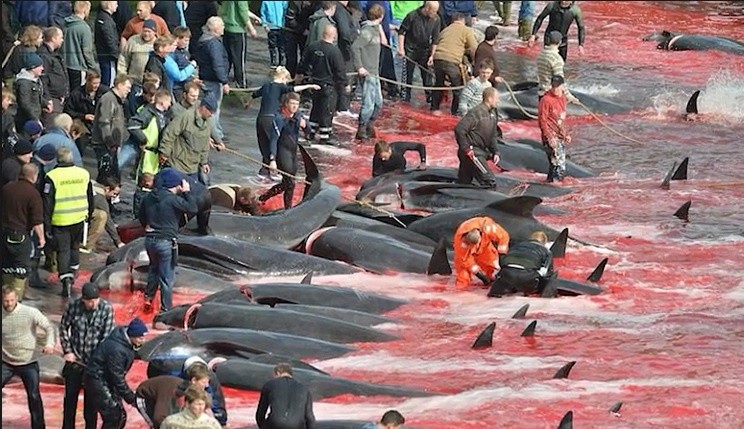
The summer months mark the start of the whaling season in the Faroe Islands. Hunting pilot whales is a tradition that dates back around 1,200 years for Faroese. Each year, pilot whales are killed for their meat and blubber. The hunt, however, is not popular among all Faroese.
The first hunt of the season took place on May 7, according to photographs taken by Ingi Sørensen, a local citizen, and underwater photographer. While some Faroese people believe the hunt should keep going as a tribute to traditional Faroese culture, Sørensen, like many others, openly criticizes the hunt.
Pilot whales are seen being dragged to shore with ropes and spears in his photographs. The pilot whales appear to be thrashing around in bloody water.
Sørensen says that it can happen four times a year and it could happen four times per year or ten times per year. The traditional hunt was a source of sadness for the underwater photographer. He expressed his sorrow for the whales and expressed his sadness for our people's lack of feelings and empathy for the animals. Sørensen seems to have given up on hoping for the tradition to ever stop. However, many believe it will eventually come to an end. thinks that it will never stop. But most people in the locale believe that it will stop someday.
Pilot Whales
Pilot whales are a type of dolphin that can be found in large numbers in the North Atlantic. This area is home to an estimated 778,000 pilot whales. Because there are so many of them in these waters, the hunt has previously been deemed sustainable.
Every year, approximately 800 pilot whales are hunted. About 1,500 dolphins were slaughtered for the hunt in the previous year, which sparked outrage and prompted the Faroese government to review its hunting policies.
Animal rights groups have been campaigning to put an end to the long-standing practice of hunting pilot whales. The hunts have been deemed inhumane and unnecessary now that the Faroese do not rely solely on whale meat for food, as they once did.
Minorities and Traitors
Helene O'Barry, a European campaign correspondent at the Dolphin Project, stated that several groups are working to end the slaughter of pilot whales, each with their strategy.
Pilot whale meat has been validated as toxic, containing high mercury levels that can cause health problems. Unfortunately, even the risks associated with consumption have not deterred hunters. According to O'Barry, those who oppose the hunt, such as Sørensen, are in the minority.
People warned O'Barry about the difficulty of openly criticizing the hunt without being labeled traitors. She emphasized that the negative stereotype of all Faroese people being whale hunters is far from accurate.
She later stated that predicting when the next hunt will happen is impossible. The majority of hunts, however, take place in the summer, as this is when most pilot whale sightings occur, Newsbreak reports.
O'Barry has contacted the Faroese government regarding the hunt. In response, a government spokesperson told her that the Faroe Islands recognize the importance of being able to sustainably use the ocean's living resources, which includes hunting pilot whales.
Read also: Barbaric Killings of Dolphins in Denmark: Coastline Turned Red as More Than 1,500 Dolphins Dead
© 2025 NatureWorldNews.com All rights reserved. Do not reproduce without permission.





